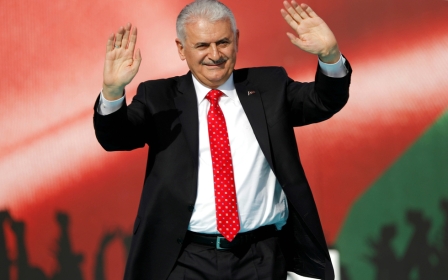Turkey issues arrest warrants for soldiers accused of Gulen links

Turkish prosecutors on Friday issued arrest warrants for 271 soldiers suspected of links to Fethullah Gulen, the exiled cleric accused of orchestrating a failed coup against President Recep Tayyip Erdogan two years ago.
State media said security forces started conducting operations across Turkey in the early hours of Friday morning in response to the warrants.
The Star newspaper said those facing arrest included 10 serving colonels and a retired general.
About 160,000 people have been detained since the coup attempt in January 2016, and about the same number of civil servants have been dismissed from their jobs, the United Nations human rights office said in March.
Of those detained, about 77,000 have been formally charged and kept in jail during their trials, the interior minister said in April.
The European Commission said that under the Turkish state of emergency more than 150,000 people had been taken into custody, 78,000 arrested and over 110,000 civil servants dismissed. Turkish authorities say that some 40,000 have been reinstated in the process.
The latest arrests come as Binali Yildirim, Turkey's outgoing prime minister, said on Thursday that a state of emergency in place since the coup would end on Monday as the country transitions to a new system of government in which executive power will be concentrated in the office of the presidency.
“The new cabinet will be announced on Monday, and the state of emergency will conclude,” Binali Yildirim told state-run Anadolu new agency.
However, he added that a decree will be issued on Friday that “will include necessary measures to avoid vulnerability in the area of counterterrorism once the state of emergency is over”.The state of emergency first went into effect on 20 July 2016, five days after the coup attempt that left around 265 people dead.
The emergency rule has given President Recep Tayyip Erdogan and his government sweeping powers, which they say have been necessary to expunge state institutions of members of US-based Gulen's FETO movement.
Critics say Erdogan has used the state of emergency as an excuse to silence opponents, with hundreds of journalists and opposition politicians arrested, including a number of MPs. The president and the government, however, say it has been necessary to fend off security threats.
Monday is also the day that Erdogan will be sworn in as president under the country's new constitution after winning elections last month.
Under the new system, approved in a referendum last year, the office of the prime minister is abolished and ministers will be directly appointed by the president.
Stay informed with MEE's newsletters
Sign up to get the latest alerts, insights and analysis, starting with Turkey Unpacked
Middle East Eye delivers independent and unrivalled coverage and analysis of the Middle East, North Africa and beyond. To learn more about republishing this content and the associated fees, please fill out this form. More about MEE can be found here.





